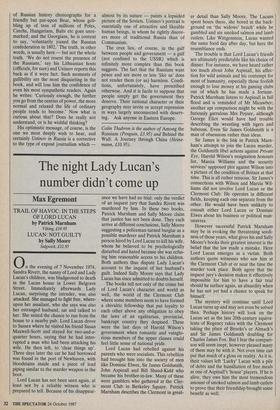The night Lady Lucan's number didn't come up
Max Egremont
TRAIL OF HAVOC: IN THE STEPS OF LORD LUCAN by Patrick Marnham
Viking, £10.95
LUCAN: NOT GUILTY by Sally Moore
Sidgwick, £12.95
0 n the evening of 7 November 1974, Sandra Rivett, the nanny of Lord and Lady Lucan's children, was bludgeoned to death in the Lucan house in Lower Belgrave Street. Immediately afterwards Lady Lucan, surprising the intruder, was also attacked. She managed to fight free, where- upon her assailant, who she says was also her estranged husband, sat and talked to her. She seized the chance to run from the house to a nearby pub. Lord Lucan drove to Sussex where he visited his friend Susan Maxwell-Scott and stayed for two-and-a- quarter hours, saying that he had inter- rupted a man who had been attacking his wife. He then left, to 'clear things up'. Three days later the car he had borrowed was found in the port of Newhaven, with bloodstains inside and a piece of lead piping similar to the murder weapon in the boot.
Lord Lucan has not been seen again, at least not by a reliable witness who is prepared to tell. Because of his disappear-
ance we have had no trial: only the verdict of an inquest jury that Sandra Rivett was murdered by him. In these two books, Patrick Marnham and Sally Moore claim that justice has not been done. They each arrive at different conclusions, Sally Moore suggesting a policeman turned burglar as a possible murderer and Patrick Marnham a person hired by Lord Lucan to kill his wife, whom he believed to be psychologically disturbed and hated because she was refus- ing him reasonable access to his children. Both authors thus dispute Lady Lucan's account to the inquest of her husband's guilt. Indeed Sally Moore says that Lady Lucan has since admitted to doubts herself.
The books tell not only of the crime but of Lord Lucan's character and world as well, the world of the Clermont Club where some members seem to have formed a chivalric fellowship that put loyalty to each other above any obligation to obey the laws of an egalitarian, provincial, bankrupt country they despised. These were the last days of Harold Wilson's government when romantic and vainglo- rious members of the upper classes could feel little sense of national pride.
Lord Lucan had rebelled against his parents who were socialists. This rebellion had brought him into the society of men like Dominic Elwes, Sir James Goldsmith, John Aspinall and Bill Shand-Kidd who became his brother-in-law. Many of these were gamblers who gathered at the Cler- mont Club in Berkeley Square. Patrick Marnham describes the Clermont in great-
er detail than Sally Moore. The Lucans spent hours there, she bored in the back- ground on 'the widows' bench' while he gambled and ate smoked salmon and lamb cutlets. Like Wittgenstein, Lucan wanted the same food day after day, but here the resemblance ends.
The trouble is that Lord Lucan's friends are ultimately predictable like his choice of dinner. For instance, we have heard rather too much about John Aspinall, his affec- tion for wild animals and his contempt for most of humanity, especially those foolish enough to lose money at his gaming clubs out of which he has made a fortune. Patrick Marnham listens to Aspinall in full flood and is reminded of Mr Micawber; another apt comparison might be with the furiously garrulous Mrs Poyser, although George Eliot would have had trouble describing the wrestling with tigers and baboons. Even Sir James Goldsmith is a man of obsessions rather than ideas.
Sir James is the link in Patrick Marn- ham's attempt to join the Lucan murder, the Goldsmith libel actions against Private Eye, Harold Wilson's resignation honours list, Marcia Williams and the security services' supposed plot against Wilson into a picture of the condition of Britain at that time. This is all rather tenuous. Sir James's connections with Wilson and Marcia Wil- liams did not involve Lord Lucan or the Clermont Club. He operates in different fields, keeping each one separate from the other. He would have been unlikely to consult either Lord Lucan or Dominic Elwes about his business or political man- oeuvres.
However successful Patrick Marnham may be in evoking the threatening seedi- ness of those years, what gives his and Sally Moore's books their greatest interest is the belief that the law made a mistake. Here Lord Lucan emerges as a victim. Both authors quote witnesses who saw him at the Clermont Club at or near the time the murder took place. Both agree that the inquest jury's decision makes it effectively impossible for him to have a fair trial should he surface again, an absurdity when he has not yet had a chance to speak for himself.
The mystery will continue until Lord Lucan turns up and may not even be solved then. Perhaps history will look on the Lucan set as the late 20th-century equiva- lents of Regency rakes with the Clermont taking the place of Brooks's or Almack's and Sir James Goldsmith doubling for Charles James Fox. But I fear the compari- son will seem inept, however pleased many of them may be with it. Not even time can put that much of a gloss on reality. As it is, their values left 'Lucky' Lucan with a pile of debts and the humiliation of free meals as one of Aspinall's 'house' players. If he is alive, they owe him the most tremendous amount of smoked salmon and lamb cutlets to prove that their friendship brought some benefit as well.


















































 Previous page
Previous page